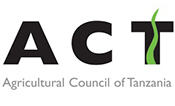Agricultural Council of Tanzania (ACT) in collaboration with other implementing partners, ADP Mbozi, BRITEN and MIICO has successfully completed the implementation of the PiATA TIJA TANZANIA project in Rukwa and Katavi regions under SUKA consortium funded by the Alliance for a Green Revolution in Africa, AGRA. The key interventions were:
- I) Promoting a Market Led Approach to Improve Profitability of Maize, Beans and Rice Value Chains in Sumbawanga and Katavi regions of Tanzania (PiATA TIJA Tanzania) - (September 2017- September 2020) with the grant amount of $ 756,990.
- ii)Upgrading and Strengthening Inputs Distribution Systems through Start-up Grants to Rural Agro-dealers in Sumbawanga and Katavi Regions (October 2018 – March 2021) with the grant amount of $ 150,000.
The overall goal under the SUKA project was to improve the livelihoods of 122,040 medium and smallholder women and men farmers in the Sumbawanga and Katavi regions while reducing shocks and stress through adaptive capacities and market-led agricultural production. This was achieved through the following specific objectives: (i) Increased staple crop productivity for smallholder farmers, (ii) Strengthened and expanded access to output markets, and (iii) Increased capacity of smallholder farming households and agricultural systems to better prepare for and adapt to shocks and stresses.
The system of ensuring inputs are available on time and reach the farmers at reasonable prices has been improved after the commencement of SUKA consortium works in Rukwa and Katavi regions. In May 2018, SUKA consortium were granted an upgrading gap filling Agro dealership development project to improve inputs distribution by transforming Village Based Agro dealers (VBAs) who were identified to develop and deliver extension methods to farmers to become village retail agro dealers through a Matching Grant support of $ 440 each. Through this intervention 150 (75 each) VBAs from Rukwa and Katavi regions were identified, trained, certified and linked to hub agro dealers and input companies in order to facilitate inputs distribution to farmers by ensuring the inputs are available on time and at reasonable prices in their rural vicinities.
As a result of this intervention, travel distance for farmers to access improved inputs has been reduced from 28km in baseline to 7km in 2021. Average yield (MT/ha) of focus value chains has increased by 4 MT/ha, 0.8 MT/ha and 6.25 MT/ha in maize, beans and paddy respectively from an average of 1.6 MT/ha maize, 0.45 MT/ha beans and 3.5 MT/ha paddy in the baseline value. In comparison to baseline year, 150 newly established agro dealers have been supported through the Agro dealer matching grants which sustainably produce improved technologies for smallholder farmers across value chains.
Through equipped skills in business building and operational efficiency, the transformed VBAs will continue to operate independently even after the phase out of the project. Through the multiplier effect of input companies to hub agro dealers to retail/rural agro dealers to farmers, more sales, profits and returns are generated. This ensures the sustainability of services delivered to actors along the value chain of input distribution.
The SUKA project, on the other hand, resulted in the rehabilitation of 18 warehouses and the construction of 2 new warehouses in Katavi Region in order to increase warehouse capacity from 13,400 MTs before intervention to 21,800 MTs after intervention to enable farmers to aggregate production of crops and grain buyers to be linked to those warehouses in order to reduce transaction costs and enhance the quality of produce and enable farmers to engage in collective marketing with strong bargaining power. Training on post-harvest practices for more than 52,000 SHFs in the region, improving the quality of produce for the market. A better collective infrastructure (warehouses) has allowed the estimated aggregation by farmers to increase from 3,200 MTs to 9,400 MTs.
Development of Sub-Business Consortia models involving farmers, agro dealers, agro processors, financial institutions, and other service companies serves as an exit strategy that ensures project sustainability after grant closure.

